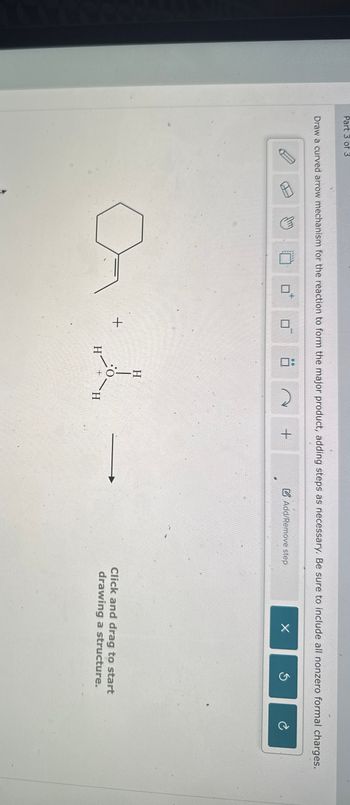
Organic Chemistry: A Guided Inquiry
2nd Edition
ISBN: 9780618974122
Author: Andrei Straumanis
Publisher: Cengage Learning
expand_more
expand_more
format_list_bulleted
Question

Transcribed Image Text:Part 3 of 3
Draw a curved arrow mechanism for the reaction to form the major product, adding steps as necessary. Be sure to include all nonzero formal charges.
+
H
H
O
H
+
Add/Remove step
Click and drag to start
drawing a structure.
Expert Solution
This question has been solved!
Explore an expertly crafted, step-by-step solution for a thorough understanding of key concepts.
Step by stepSolved in 2 steps with 1 images

Knowledge Booster
Similar questions
- Draw the simplest curved arrow mechanism possible for the reaction shown below. You may need to re-draw structures to show bond lines or lone pairs. D ~~ X AJ 'n harrow_forwardDraw a curved arrow mechanism for the reaction to form the major product, adding steps as necessary. Be sure to include all nonzero formal charges. U c+ C + C H A H H + Add/Remove step Click and drag to start drawing a structure.arrow_forwardDraw a curved arrow mechanism for the substitution reaction that will occur with the alkyl halide and nucleophile below, adding steps as necessary. Be sure to include all nonbonding electrons and all nonzero formal charges, and show all species that react or are formed in this reaction. ох Br H₂Oarrow_forward
- Draw a curved arrow mechanism for the reaction, adding steps as necessary. Be sure to include all electrons that are necessary to the mechanism and all nonzero formal charges. 0-H + Add/Remove step G P H == :0-S :0. Click and drag to start drawing a structure.arrow_forwardCurved arrows are used to illustrate the flow of electrons. Using the provided starting and product structures, draw the curved electron-pushing arrows for the first step of this reaction sequence. Be sure to account for all bond-breaking and bond- making steps. I H BH₂ H B H Select to Add Arrows > H Bll H BH₂arrow_forwardDo not use chatgpt. Thank you!arrow_forward
- Draw a curved arrow mechanism for the reaction. Add steps as necessary and be sure to add lone pairs and charges where relevant. :Br: H₂O :Br: & :0 :O: OH + Add/Remove step X Ś Click and drag to start drawing a structure. Ć Oo E olo 18 Ar 8: [1]arrow_forwardCurved arrows are used to illustrate the flow of electrons. Using the provided starting and product structures, draw the curved electron-pushing arrows for the following reaction or mechanistic steps. Be sure to account for all bond-breaking and bond-making steps. **Y...= Select to Add Arrows HCI :CI:O Select to Add Arrows Hội H 19: Draw the product of the reaction shown below. Ignore inorganic byproducts. SH NaH, PhCH₂Cl DMSO Problem 35 of 20 Q Please select a drawing or reagent from the question area Problem 35 of 20 Please select a drawing or reagent from the question area Problem 42 of 20 Submit Atoms, Bonds and Rings Draw or tap a new bond to see suggestions. Charges Submit Undo Remove Reset Done Submit Drag To Panarrow_forwardPlease answer fast i give upvotearrow_forward
- Draw bith the higher molecular weight prlduct and the lowe weight productarrow_forwardDo not handwriting solution. Thank you!arrow_forwardDraw a curved arrow mechanism for the substitution reaction that will occur with the alkyl halide and nucleophile below, adding steps as necessary. Be sure to include all nonbonding electrons and all nonzero formal charges, and show all species that react or are formed in this reaction.arrow_forward
arrow_back_ios
SEE MORE QUESTIONS
arrow_forward_ios
Recommended textbooks for you
 Organic Chemistry: A Guided InquiryChemistryISBN:9780618974122Author:Andrei StraumanisPublisher:Cengage Learning
Organic Chemistry: A Guided InquiryChemistryISBN:9780618974122Author:Andrei StraumanisPublisher:Cengage Learning

Organic Chemistry: A Guided Inquiry
Chemistry
ISBN:9780618974122
Author:Andrei Straumanis
Publisher:Cengage Learning